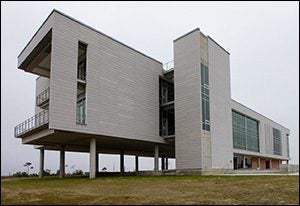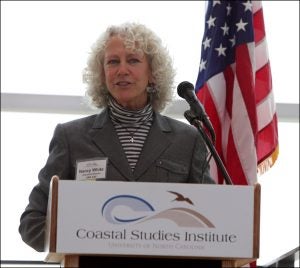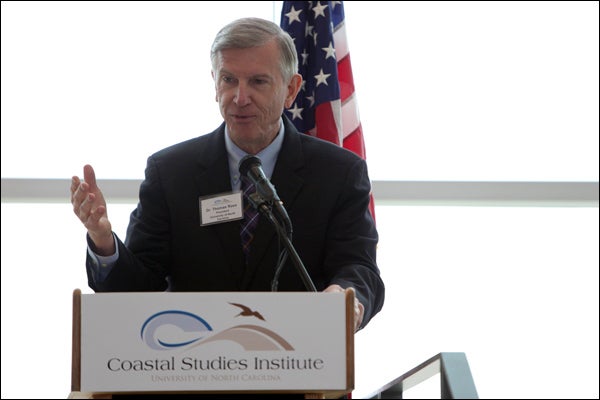DRAWING ‘THE BEST MINDS’
UNC Coastal Studies Institute dedicates facility in Manteo
Jan. 15, 2013
MANTEO – A center for research in coastal development and natural resources was dedicated and officially opened Jan. 15, kicking off a series of community outreach events continuing through the spring.
Formed in 2003, the UNC Coastal Studies Institute is an inter-university partnership that offers research and educational opportunities while providing community outreach program and enhancing communication among those concerned with the maritime counties of North Carolina.
ECU is a leader among the multiple institutions involved with the institute, which include UNC Chapel Hill, N.C. State University, UNC Wilmington and Elizabeth City State University.
ECU Chancellor Steve Ballard and ECU Board of Trustees members were among the university administrators, local dignitaries and community members gathered for a dedication ceremony and self-guided tours of the institute’s new home on Roanoke Island. The 83,791-square-foot, environmentally sustainable facility was built over two years on land surrounded by approximately 240 acres of marsh.
Project costs totaled $32.6 million, paid for by state appropriations. ECU was responsible for design and construction oversight and will continue to provide maintenance at the facility, said Bill Bagnell, associate vice chancellor for campus operations.
“Now that you have given us the tools that we need, we will make you proud,” promised Institute Director Dr. Nancy White, also an associate professor of biology at ECU. “Education not only creates jobs, it transforms lives.”
Other ECU faculty involved with the institute include economics professor Dr. Andy Keeler, head of the Public Policy and Coastal Sustainability; Dr. Nathan Richards,

The UNC Coastal Research Institute, dedicated Jan. 15, is a partnership among multiple universities including ECU.
heading the Maritime Heritage Program; and geological science professors Drs. Reide Corbett and J.P. Walsh, interim co-heads of Coastal Processes.
“We’re committed to being a national model of regional transformation,” said Dr. Ron Mitchelson, vice chancellor of Research and Graduate Studies at ECU. “This is a magnet for that future.”
Research under way at the institute ranges from efforts to restore oyster reefs to studying the ecological effects of stormwater runoff to developing sustainable designs for coastal communities.
“The work that will take place here will have an effect on the lives of people all over the world,” said UNC President Tom Ross during a brief keynote address. “We hope to bring the best minds from the UNC system to come here and to work.”
He added that the ability for researchers to pursue different projects but have regular interaction at the facility increases the quality of the work.
Ross also stressed that the bounty of North Carolina’s lengthy coastline comes with a responsibility.
“It is incumbent upon us to understand it, protect it and use its resources in a responsible way,” he said.
Local communities will also be regularly involved. The institute grew out of the Dare County Task Force on Higher Education, formed in the mid-90s. It was also preceded by other successful state-university-community partnerships, such as those that founded the North Carolina aquariums in the 1980s.
“Our eastern NC counties, municipalities and their leadership have embraced the idea…of this research mission,” said Michael Kelly, chair of the institute Board of Directors

ECU professor Dr. Nancy White, UNC Coastal Studies Institute director, speaks at the dedication.
“We are producing some very bright, talented young people,” said Warren Judge, chair of the Dare County Commission. “I’m excited that our students…will go off to university, but will have the ability to come back here (to the institute) for graduate studies and to teach and work.”
An open house for people living and working in northeastern North Carolina is scheduled Feb. 2.
More information about the institute is available at http://csi.northcarolina.edu/.
